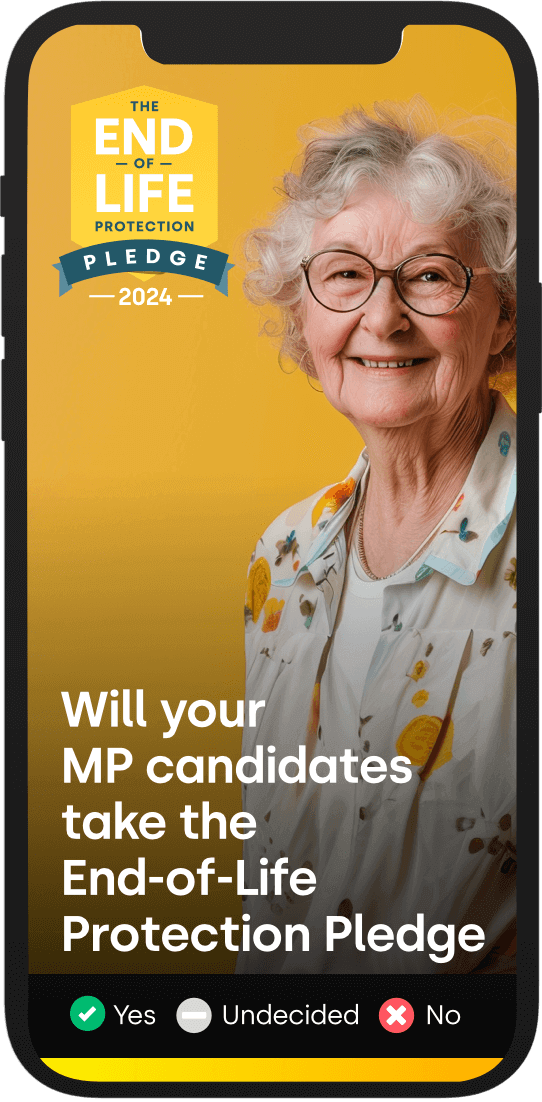
Candidates who sign the End-of-Life Protection Pledge commit to vote against the introduction of assisted suicide and support better palliative care at the end of life.
If elected, I pledge to:

Vote against any attempts to introduce assisted suicide or euthanasia
Protect the vulnerable by voting against any attempts to introduce assisted suicide or euthanasia
Assisted suicide is the act of assisting another person in ending their own life and euthanasia is the intentional ending of another person’s life.
The main legal difference between assisted suicide and euthanasia is the identity of the person carrying out the act of killing. In euthanasia, the person has their life ended by a third party whereas in assisted suicide, the person ends their life themselves.
No major disability advocate groups in the UK – including Disability Rights UK, Scope and Not Dead Yet – support a change in the law to introduce assisted suicide or euthanasia.
Polling commissioned by SCOPE showed that two-thirds of people with disabilities (65%) – and three-quarters (76%) of young disabled people – believe that disabled people are often seen by the public as a burden to society.
The poll found that the majority of people with disabilities (64%) – including nearly three-quarters (72%) of young disabled people – are concerned about moves to legalise assisted suicide. Nearly two-thirds (62%) of people with disabilities who were concerned about a change in the law were worried that pressure would be put on disabled people to end their lives prematurely.
Richard Hawkes, CEO of disability charity Scope said:
“The campaign to legalise assisted suicide reinforces deep-seated beliefs that the lives of disabled people are not worth as much as other people’s. It’s a view that is all too common. The current law against assisted suicide works. It sends a powerful message countering the view that if you’re disabled it’s not worth being alive, and that you’re a burden”.
No doctors’ groups in the UK support changing the law to introduce assisted suicide or euthanasia, including the British Medical Association, the Royal College of General Practitioners, the Royal College of Physicians, the British Geriatric Society, and the Association for Palliative Medicine.
In particular, there is strong opposition to introducing assisted suicide from doctors who specialise in working with people with incurable conditions at the end of their life.
A survey of palliative care doctors who are members of the Association for Palliative Medicine found that 82% oppose the introduction of assisted suicide.
Responding to the results of the survey, APM President Dr David Brooks, Macmillan consultant in palliative medicine at the Chesterfield Royal Hospital and Ashgate Hospice, said:
“Palliative physicians dedicate their working lives to helping patients with incurable illness live as well as they can for as long as they can, and, where death is imminent, to live those dying days in as much comfort and dignity as possible.”
“These results give a clear message to legislators that those who care for terminally ill people believe society should be supporting people at this time in their lives and not putting them at risk. They also make clear that if society does want to legalise assistance in suicide, this should not be part of medical practice. People need to be confident that the doctor is there to care for them not to kill them.”
The results of the Association for Palliative Medicine survey have been mirrored in a more recent survey of doctors by the British Medical Association, which found that 83% of palliative care doctors oppose a change in the law to introduce assisted suicide, while only 6% supported such a change.
Palliative care doctors have specialist knowledge and experience of the care that can be provided to people to alleviate suffering at the end of their lives and the results of these surveys show that it is clear to these doctors that specialist care is the solution, not ending their patients’ lives through assisted suicide.
Polling from ComRes found that 51% of the general population, when asked if they “would be concerned that some people would feel pressurised into accepting help to take their own life so as not to be a burden on others if assisted suicide were legal”, said yes. Only 25% disagreed.
Polling of Members of Parliament, conducted by YouGov, showed that only 35% of MPs supported a law change to allow “doctors to assist in the suicide of someone suffering from a terminal illness”.

Support increased funding for palliative care for people at the end of their lives
Support better palliative care by backing policies or legislation changes that will increase funding and provision of high-quality palliative care for people at the end of their lives
Palliative care involves improving the quality of life for adults or children facing a life-threatening illness. It consists of the prevention and relief of suffering by early identification, correct assessment and treatment of pain and other problems.
There is currently a major gap in the provision of palliative care services in the United Kingdom.
It is estimated that over 100,000 people who could benefit from palliative care die each year without receiving it. According to Hospice UK, the UK hospice sector is facing a collective estimated deficit of £77 million in the financial year 2023-24.
Demand for palliative care is set to increase. In 20 years’ time, there are expected to be 100,000 more people dying each year in the United Kingdom. Analysis by Marie Curie shows that by 2048, the number of people with palliative care needs in the UK will climb by more than 147,000 to over 730,000.
A YouGov poll commissioned by King’s College London shows that 65% of the general population are worried about access to palliative and end-of-life care and 41% think there is too little NHS resource allocated to palliative care.
Professor Katherine Sleeman, from the Florence Nightingale Faculty of Nursing, Midwifery & Palliative Care at King’s College London, said:
“The fact that 65% of UK adults say they are worried about access to palliative and end of life care should be a wake-up call for current and future governments. This is especially important given the large increase in palliative care need that is projected over the next decade”.
There is an urgent need for better funding of palliative care to fill the current major gap in the provision of palliative care services and prepare for the projected large increase in demand for these services.
Are you an MP candidate?
Click here or email pledge@righttolife.org.uk to sign the pledge.

